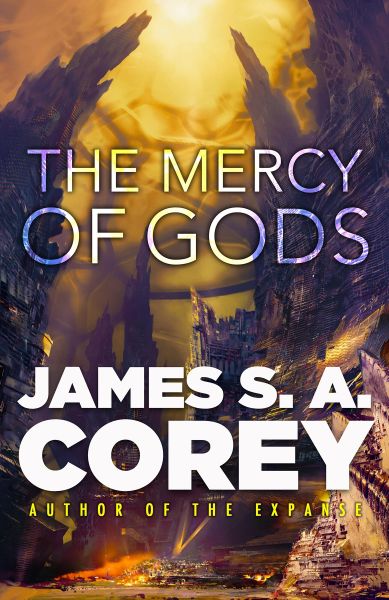Defiance
The Mercy of Gods (The Captives’ War, volume 1)
By James S. A. Corey

22 Aug, 2024
2024’s The Mercy of Gods is the first volume of James S. A. Corey’s science fiction series, Captives’ War.
The novel biome of which humans are part first appeared on Anjiin three and a half millennia ago. Utterly unlike the lifeforms that existed for billions of years before, the new biome has been slowly spreading across Anjiin ever since. Too unlike each other to interact save indirectly, old and new biome exist alongside each other.
Tonner Freis and his team have worked out how to bridge the gap, to translate from one genetic system to another. This breakthrough makes them a target in a relentless academic struggle.
Another, equally relentless, far vaster, struggle is bearing down on Anjiin.
For the Carryx, Anjiin is just another world to claim. Humans are just novel animals to assess. If useful, they will be exploited. If not useful, humans will be exterminated. The Carryx have conquered worlds much like Anjiin before. They intend to keep doing so until (or if) they encounter a superior able to stop them.
Anjiin’s humans are not superior. Resistance is, as they say, futile. Anjiin is swiftly occupied. An eighth of the population is swiftly and summarily killed to demonstrate Carryx superiority. The survivors can only wait their fate.
The Carryx do not blindly invade. Before the sudden, overwhelming attack, they studied Anjiin carefully. They are quite aware of Tonner and his subordinates: Else, Campar, Dafyd, Rickar, Jessyn, Synnia, Nöl, and Irinna. The team’s work is potentially useful to the invaders. Nöl alone is killed as part of the intimidation phase. The others are carried off as prisoners.
The team finds itself imprisoned in an alien facility on an alien world. They are assigned a task based on their research. However, as their keeper informs them “The only test is whether a subject species is useful. Usefulness is survival.” It’s up to the humans to prove themselves useful… or die.
The dwindling team discovers that there are unspoken rules. For example, they are not the only captives assigned a genetic code translation task. The rival teams are free to murder each other. There are other rules as well, none of which the Carryx care to explain. Animals incapable of navigating the maze on their own are not useful.
The Carryx have a sufficient grasp of their human captives to control them. Too bad for the Carryx that they are at war with a great enemy and that that great enemy has slipped an agent into the human groups. That agent is gathering information. When the opportunity presents itself, the agent will send what it has learned to its creators.
To succeed in its mission, the agent will need human cooperation… and for that to be possible, the humans will have to come to terms with the unspeakable means by which the agent is able to pass itself off as human.
~oOo~
If I had a relentlessly grim tag, this novel would receive it.
I too wondered if it’s a coincidence that Anjiin sounds like the Japanese word for pilot.
Throughout the novel, there are excerpts from the “final statement of Ekur-Tkalal, keeper-librarian of the human moiety of the Carryx,” from which we can deduce that by the point it makes the statement, the war has developed not necessarily to the Carryx’s advantage. Ekur-Tkalal’s pontifications concerning its species behavior towards other species seem defensive… or at least affronted that others embrace standards of judgment other than “it worked and we got away with it for a long time.”
The glimpses of Carryx philosophy we are given remind me of Starship Trooper’s worldview… as it would have been seen by humanity’s alien neighbors. It’s not surprising that there is a vast (if unclearly documented in this volume) alliance against the Carryx, because the alternative is conquest, exploitation, or/and extinction. To know the Carryx is to want to drop a supernova trigger into their stars.
(I was also reminded of the Penric and Desdemona stories for reasons that are a spoiler. Don’t expect this novel to emulate Bujold’s humanitarian sensibilities.)
From the protagonists’ perspectives, grander events are beyond their reach, at least for the moment. All they can do is a play their parts in an actor’s nightmare in which the penalty for missing lines is summary execution. The suspense levels are, as one might expect, high.
While The Mercy of Gods establishes the setting and stakes, the story is by necessity more introduction than complete story. Nevertheless, there are sufficient mysteries and horrifying events to interest readers, provided they understand this is not the volume featuring closure.
The Mercy of Gods is available here (Amazon US), here (Amazon Canada), here (Amazon UK), here (Barnes & Noble), here (Chapters-Indigo), and here (Words Worth Books). The Mercy of Gods is also available here (Apple Books), but only as an audio book.
